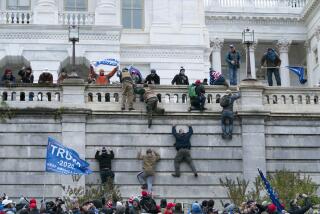Coup d’Etat by John Harvey (Atheneum: $16.95; 480 pp.)
- Share via
Everywhere, the Juntas come and go, the dictatorships, the coups, the countercoups, the restorations to civilian rule. Trying to follow the revolutions of the Right is like watching shadow puppets.
John Harvey’s fine novel explores changes in the life of an extended Greek family from the coup of the colonels in 1967 to the end of the dictatorships in 1974. The breadth of the family strains our credulity, as perhaps it must to encompass so much of a complex society: One of two brothers-in-law is a lawyer opposing the regime, the other is an ambitious undersecretary in the regime; the son of the undersecretary is a gradually radicalized student; the father of the two sisters is a slightly batty merchant whose misadventures (stocking up on plastic pails and toys at the end of the beach season, buying shares in a ferry) blend pathos and black comedy. After the lawyer is imprisoned, he, his lovely wife Chryssa, and an English journalist named Michael become a triangle reminiscent of Rick, Victor Laszlo and Ilsa in “Casablanca.”
The strength of “Coup d’Etat” is Harvey’s well-crafted prose. The trials of Vangelis, the lawyer who is subjected to the exquisite torture reserved for opponents of the regime, are too often rendered in a breathless Joycean internal monologue, but the eye is observant and understanding. In the midst of a torture session, when the blows suddenly stop, Vangelis finds himself tracing the curved lines around the edge of a metal tray.
The political rise and fall of Leonidas, the undersecretary, is chronicled in flat, frequently arch prose; by distancing us, the prose makes his bureaucratic woes seem petty. Yet his deep personal frustrations are sympathetically evoked. When his dinner-table antics are not appreciated, Leonidas looks “at his salt wife with yellow eyes of hatred.” The word salt , with its unstated allusions, is perfect. The son Alexis, asked whether he will follow his father’s career, repeats what he had heard others say as a joke: “I wouldn’t do that. I’m an honest man.” As he says it, he hears “. . . something in his voice so thin, so acid, so sharp” that he knows his words have come across not as a joke, but as an insult. The love antinomy of Chryssa is real, not rapturous; the caresses of words and hands, and the pain of choice and separation, are convincing and moving.
The prose is least successful when the viewpoint shifts to an anonymous observer, such as a soldier watching the mobilization of troops. Although always elegant and economical, Harvey’s renderings of these set pieces, and his long narrative of the battle for Cyprus, convey less of the sense of a world on edge than do the precise portraits of his main characters, or the wonderful description of an imminent Turkish attack that in tone is reminiscent of Cavafy’s poem “Waiting for the Barbarians.”
More to Read
Sign up for our Book Club newsletter
Get the latest news, events and more from the Los Angeles Times Book Club, and help us get L.A. reading and talking.
You may occasionally receive promotional content from the Los Angeles Times.







